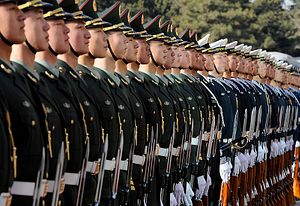As people across the world celebrate Chinese New Year by visiting family, rolling dumplings, and enjoying a well-earned rest, there is at least one group in China hard at work: the Central Military Commission’s Discipline Inspection Commission (DIC). Their officers are spending the holidays conducting a survey of discipline in the Chinese military, according to the Ministry of National Defense website.
Specifically, they are inspecting the People’s Liberation Army’s progress toward “the complete realization of the [Communist Party of China] Central Committee’s eight rules and the Central Military Commission’s ten rules, systematic rules concerning the development of spirit and work style,” a campaign first rolled out in December 2012. This may seem like mind-numbing way to spend a holiday (and it is), but there is a method to the madness.
The rules list specific types of corruption President Xi Jinping is attempting to stamp out. The Central Committee’s list calls for eliminating unnecessary inspection tours, meetings, speeches, news coverage, and special privileges as well as unapproved publications and expensive amenities during official visits. Responding to the Central Committee’s eight rules, the Central Military Commission issued ten rules of its own, further targeting unnecessary classified reports, favoritism, and graft in contracting. Leading expert James Mulvenon provides a summary and analysis of the military’s rules here.
The Party blames these issues on improper “work style,” specifically the “four styles” of formalism, bureaucratism, hedonism, and extravagance. There is significant overlap between the definitions of these styles and some say they all stem from bureaucratism, meaning the separation of Party members from the people and their practical experiences. It is under the banner of improving work style that the DIC is inspecting for compliance with the rules.
The Party has historically pointed to improper work styles as the target of its rectification campaigns, mobilizing intense social pressure and self-criticism to combat them. The first of these campaigns occurred during World War II at the Party’s Yan’an base. Since then they have been reinstituted at various points, including during the extreme turmoil and destruction of the Great Leap Forward and the Cultural Revolution.
This history is surely not lost on China’s older generations, least of all on Xi himself. But unlike Mao’s call to “bombard the headquarters,” Xi’s campaign is designed to be orderly, having a form of Maoism while denying the power thereof. Rather it serves as a reminder of the power of the Party to guide its own course and the fates of its people, quite apart from what individuals within the system might think is prudent.
The problem Xi is attempting to address, however, is not easily solved. While serving as a military attaché in Beijing, I was consistently impressed by the resources China put towards official hosting. Many things that are absent or minimized when the U.S. hosts officials, including most meals, gifts, and lodging, are ingrained into Chinese official culture. If the DIC is successful at enforcing these anti-corruption measures, it would in effect be bringing the Chinese military into better alignment with its Western counterparts in conducting official business.
But that is the rub: these practices have become so entrenched into China’s bureaucratic and social landscape that cadres feel obligated to follow them. For an officer hosting a superior to ignore the customary niceties and follow the new rules would be a significant leap of faith. The DIC may hold out the threat of punishment, but until the reward for following the rules is greater than the reward for flattering a superior, the campaign will not change the culture of giving and receiving perquisites.
Ben Lowsen is a specialist in Chinese political and security affairs. He previously served in the U.S. Army as a field artillery officer, China specialist, and U.S. military attaché to Beijing.

































